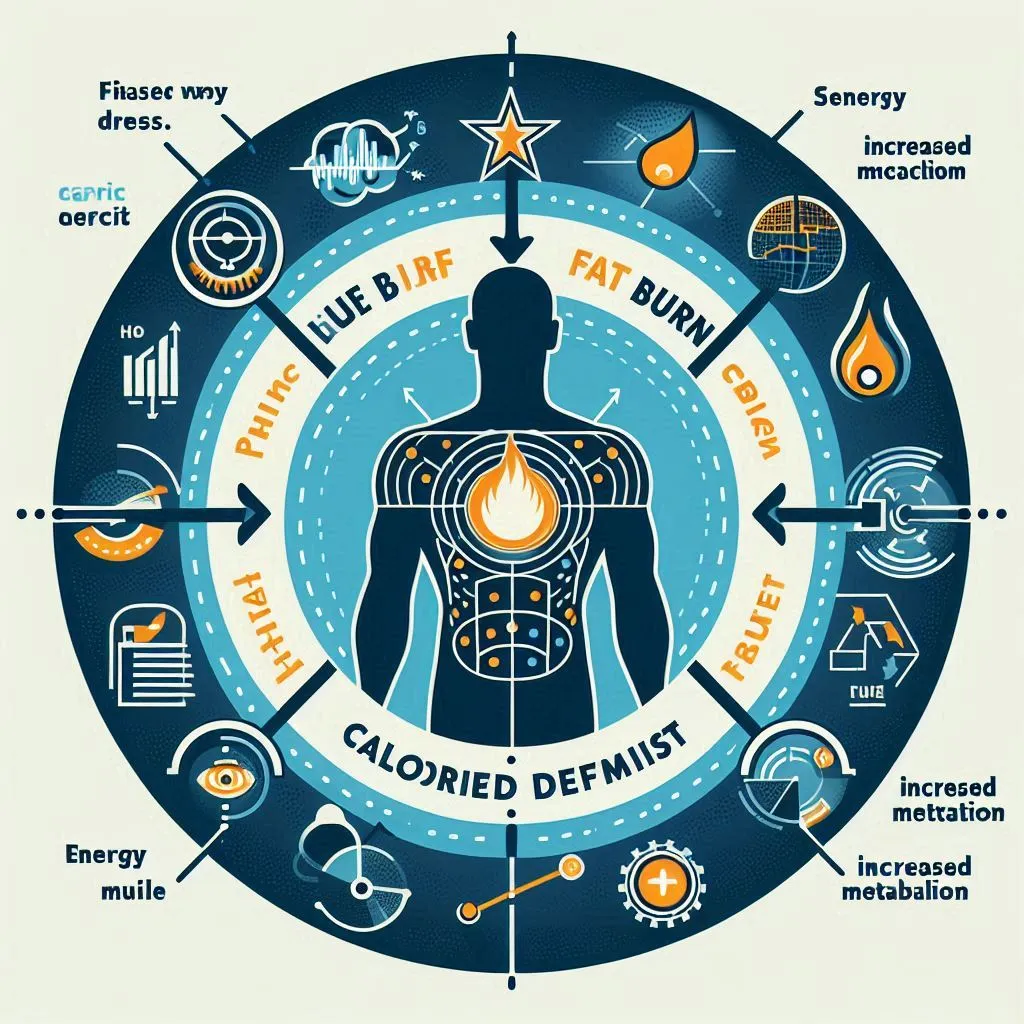
Introduction to 2024 Weight Loss Trends
The landscape of weight loss solutions in 2024 is being significantly shaped by innovative products and emerging trends. Among these, weight loss pills have gained substantial attention, particularly those available on popular e-commerce platforms like Amazon. Consumers are increasingly seeking rapid weight loss solutions that promise quick results, often driven by the pressures of societal standards and an ever-evolving health narrative. This trend has ushered in a variety of weight loss pills that tout powerful formulations aimed at suppressing appetite, boosting metabolism, and facilitating fat burn.
The rise of these supplements has sparked considerable debate regarding their effectiveness and safety. While traditional methods, such as maintaining a balanced diet and engaging in regular exercise, have long been celebrated as foundational elements of weight loss, the recent focus on quicker alternatives raises questions about sustainability and health implications. Users of weight loss pills may experience immediate results; however, it is crucial to evaluate their long-term efficacy and safety profiles. Many experts argue that the integration of pills into a comprehensive weight loss plan should not overshadow the enduring value of lifestyle changes, including nutrition and physical activity.
This blog post will delve into the various weight loss pills trending in 2024, examining their ingredients, mechanisms, and user testimonials. Concurrently, we will compare these solutions to traditional weight loss practices, offering insights into the holistic approach needed for effective weight management. Understanding these diverse strategies will be essential for individuals aiming to make informed decisions on their weight loss journey in the coming year.
The New Weight Loss Pills of 2024
As we move into 2024, the market for weight loss pills has evolved significantly, with several new products capturing the attention of consumers on platforms like Amazon. These pills typically promise to enhance metabolism, suppress appetite, or both, offering a tempting solution for those struggling with weight management. The latest formulations often include innovative ingredients that target fat burning more effectively than previous generations of weight loss supplements.
Among the most talked-about pills this year are those containing compounds such as berberine, a natural plant alkaloid that has been shown to help regulate glucose metabolism and fat storage. Another ingredient making waves is glucomannan, a soluble fiber known for its appetite-suppressing qualities. Many of these new products tout the inclusion of vitamins and minerals designed to further support energy levels and overall health, making them appealing from a holistic health perspective.
While the claims surrounding these weight loss pills can be enticing, it is essential to consider potential side effects. Common issues reported by users include gastrointestinal discomfort, bloating, and headaches. It is advisable for consumers to read detailed reviews and scrutinize the ingredients to ensure they align with their health needs and goals. Additionally, consulting a healthcare professional before starting any new supplement regimen is recommended to avoid adverse reactions, particularly for those with pre-existing medical conditions.
Consumer reviews on these products vary widely, with plenty of users praising their effectiveness in suppressing appetite or boosting energy levels. However, some customers express skepticism regarding the long-term sustainability of weight loss achieved through these pills. As the demand for effective weight loss solutions grows, it becomes increasingly important to navigate this landscape carefully and prioritize personal health and safety over quick fixes. Understanding the benefits and drawbacks of these new weight loss pills can aid consumers in making informed decisions about their weight loss journeys in 2024.

The Science Behind Quick Weight Loss
Understanding the science of quick weight loss is crucial for anyone considering such methods. At the core of weight loss lies the concept of a caloric deficit, which occurs when the number of calories consumed is less than the number of calories expended. This deficit triggers the body to utilize stored fat for energy, leading to weight loss. Quick weight loss methods often emphasize the importance of significantly reducing caloric intake. However, it is essential to approach this with caution, as rapidly shedding weight can impact various bodily functions.
The role of metabolism in weight loss cannot be understated. Metabolism refers to the chemical processes that convert food into energy. A higher metabolic rate can facilitate a quicker weight loss process. Individuals can increase their metabolic rate through activity and muscle mass as muscle burns more calories at rest compared to fat. However, significant caloric restriction can slow metabolism, as the body may adapt to conserve energy, making it counterproductive for those seeking rapid outcomes.
Moreover, quick weight loss methods often involve supplements that claim to enhance fat loss and improve results. While some dietary pills can aid in appetite suppression or fat burning, it is vital to scrutinize the safety and efficacy of these supplements. Some may lead to harmful side effects or deficiencies in essential nutrients. Therefore, it is crucial for individuals to consider these elements before embarking on a rapid weight loss journey. Consulting with a healthcare professional or a registered dietitian can provide personalized guidance tailored to one’s health needs.
Overall, while quick weight loss solutions can produce immediate results, understanding the underlying science is necessary to ensure health is not compromised in the process.

Daily Workouts: Boosting Weight Loss Effectively
In the pursuit of effective weight loss solutions, incorporating daily workouts stands as a critical factor. Regular physical activity not only helps in burning calories but also plays a vital role in enhancing overall health and well-being. Diverse workout routines, including cardiovascular exercises, strength training, and flexibility workouts, offer unique benefits that contribute to efficient weight loss.
Cardiovascular exercises, commonly referred to as cardio, are essential for elevating the heart rate and promoting significant calorie expenditure. Activities such as running, cycling, or swimming provide an excellent way to increase endurance and stamina while simultaneously aiding in weight reduction. Engaging in at least 150 minutes of moderate-intensity cardio each week is recommended for optimal weight loss, with many experts suggesting that a higher frequency may yield better results.
Incorporating strength training into a daily workout routine is equally important. Resistance exercises, which can range from weightlifting to bodyweight activities such as squats and push-ups, help build lean muscle mass. This process is crucial because muscle tissue burns more calories at rest compared to fat tissue, thus fostering a higher basal metabolic rate. Aim for at least two to three sessions of strength training per week for comprehensive benefits.
Moreover, flexibility exercises should not be overlooked. Activities such as yoga and Pilates improve flexibility, reduce the risk of injury, and aid in recovery. Such workouts encourage mindfulness and body awareness, which can foster a more positive attitude toward fitness and weight loss goals. Implementing these routines can create a balanced workout plan that addresses various aspects of fitness while supporting efficient weight loss.
In conclusion, a well-rounded approach that integrates cardio, strength training, and flexibility workouts is instrumental in maximizing weight loss efforts. By consistently dedicating time each day to physical activity, individuals can significantly enhance their chances of achieving and maintaining their weight loss goals effectively.
Staying Energized During Weight Loss
Maintaining energy levels during a weight loss journey is essential to ensure physical performance and overall well-being. One of the critical components of sustaining energy is through proper nutrition. A balanced diet rich in whole foods, such as fruits, vegetables, lean proteins, and whole grains, can provide the necessary nutrients to fuel daily activities while promoting fat loss. Consider incorporating complex carbohydrates, which are digested slowly, providing a steady source of energy. Foods like quinoa, brown rice, and sweet potatoes can be beneficial in this regard.
Hydration plays a pivotal role in energy levels as well. Dehydration can lead to feelings of fatigue and lethargy, undermining weight loss efforts. It is crucial to drink sufficient water throughout the day, particularly before, during, and after workouts. Aim to consume at least 8–10 cups of water daily, adjusting for individual activity levels and climate. Additionally, incorporating hydrating foods such as cucumbers, watermelon, and oranges can further enhance hydration.
Adequate rest and recovery are often overlooked but are vital for maintaining energy. Insufficient sleep can disrupt hormonal balance, leading to increased cravings and decreased motivation to engage in physical activity. Prioritizing quality sleep and establishing a consistent sleep schedule can help keep energy levels up and enhance weight loss efforts. Aim for 7–9 hours of sleep each night and consider techniques such as mindfulness or relaxation exercises to improve sleep quality.
Incorporating these strategies—focusing on nutrition, staying hydrated, and ensuring adequate rest—can significantly influence energy levels during weight loss. By adopting best practices, individuals can optimize their physical performance and make their weight loss journey not only successful but also sustainable.

Combining Pills and Workouts: A Balanced Approach
The pursuit of effective weight loss solutions has led many individuals to explore the simultaneous use of weight loss pills and rigorous workout routines. A balanced approach that integrates both supplementation and exercise can maximize benefits, provided that individuals are careful to manage timing, dosage, and personal response to the regimen. First and foremost, it is crucial to consult with healthcare professionals before starting any new pills, as adverse effects can occur if they do not complement an individual’s unique physiological makeup.
When considering the integration of pills into a workout plan, timing plays an essential role. For many weight loss supplements, consuming them before a workout may enhance energy levels and endurance, thereby improving workout performance. Conversely, certain products may induce gastrointestinal discomfort if taken too close to physical activity. It is advisable to experiment with pill timing while carefully monitoring individualized responses to find an optimal schedule that supports both energy enhancement and comfort.
Dosing is another critical factor that can affect overall well-being and weight loss success. Following the manufacturer’s instructions and not exceeding recommended dosages are vital to avoid adverse reactions. Additionally, individuals should remain attuned to their bodies, recognizing signs of discomfort or fatigue, which may indicate the need to adjust either the workout intensity or the pill regimen. An effective practice involves setting realistic fitness goals and integrating gradual changes to both diet and exercise routines, allowing the body ample time to adapt.
Ultimately, achieving weight loss through combining pills and workouts requires a focused strategy grounded in a keen awareness of personal limits. This holistic approach cultivates not only physical results but also encourages a sustainable lifestyle conducive to overall health and well-being.
Potential Risks and Considerations
As individuals increasingly seek quick and effective weight loss solutions, the usage of weight loss pills has become a popular choice, particularly in conjunction with intense workout regimens. However, it is essential to consider the potential risks associated with these products. Weight loss pills can lead to various side effects, including gastrointestinal issues, increased heart rate, elevated blood pressure, and mood swings. These adverse effects can significantly impact an individual’s overall health, especially when compounded by strenuous physical exercise.
Moreover, the interaction of weight loss pills with other medications can create additional health risks. Many individuals do not realize that weight loss supplements can interfere with prescription medications, leading to potentially harmful consequences. For instance, certain stimulants found in weight loss pills might enhance the effects of antidepressants, resulting in heightened anxiety or cardiovascular issues. Therefore, the importance of a thorough medical consultation cannot be overstated. Individuals considering the incorporation of weight loss pills into their routine are advised to discuss their plans with healthcare professionals. This step is crucial not only to ensure safety but also to determine an appropriate dosage and regimen that aligns with one’s specific health needs.
Additionally, it is imperative to recognize that relying solely on weight loss pills is not a sustainable or healthy long-term strategy for weight management. They should be viewed as part of a comprehensive approach that includes balanced nutrition and regular physical activity. Education on the proper use and potential hazards of these supplements can empower individuals to make informed choices regarding their weight loss journey. By understanding the risks involved, individuals can better navigate their path toward successful and healthy weight management.
Success Stories: Real-Life Transformations
Real-life weight loss transformations can serve as powerful motivators for individuals seeking to embark on their own journeys. Many people have successfully turned to revolutionary weight loss solutions that include the latest pills and structured daily workouts. Their stories often reflect a path marked by determination, resilience, and empowerment. One such example is Sarah, a 34-year-old mother of two, who struggled with her weight for years. After trying various diets without sustainable success, she discovered a specialized weight loss pill that complemented her new workout regimen. Armed with a personalized fitness plan, Sarah reported increased energy levels, leading her to engage in activities she previously avoided, like running and group fitness classes. Over the course of six months, Sarah not only lost 30 pounds but also gained confidence and a renewed zest for life.
Similar success is echoed by James, a 45-year-old office worker who battled with sedentary lifestyle challenges. After reading about innovative weight loss pills that target specific metabolic functions, he decided to incorporate them into his daily routine. Alongside these pills, James committed to a manageable daily workout schedule that included brisk walking and resistance training. This combination proved transformative; he lost over 40 pounds within eight months. James credits the weight loss pills for enhancing his energy levels, which allowed him to maintain high physical activity, even after long workdays.
Such stories highlight the pivotal role of perseverance in overcoming obstacles during the weight loss journey. Individuals often face setbacks, whether it’s craved foods, time constraints, or motivational dips. However, the supportive community they found through online forums and groups where they could share experiences bolstered their resolve. By following best practices and staying connected with others, these individuals managed not just to lose weight but to sustain their new lifestyles beyond initial success. With their inspiring journeys, they serve as living proof that effective weight loss solutions can facilitate meaningful transformations.

Conclusion: Your Weight Loss Journey in 2024
As we navigate the ever-evolving landscape of weight loss solutions in 2024, it becomes increasingly evident that achieving and maintaining a healthy weight is a multifaceted endeavor. This blog has examined the latest innovations in weight loss pills, the effectiveness of various workout regimes, and essential best practices aimed at fostering long-term health and wellness.
While weight loss pills may offer a convenient and often rapid means of shedding pounds, it is crucial to integrate them into a broader lifestyle approach. Relying solely on these pills can lead to a cycle of temporary results and potential health risks. Hence, establishing a sustainable routine that includes regular physical activity is imperative. Consistent workouts not only contribute to weight loss but also enhance cardiovascular health, muscle strength, and overall well-being.
Moreover, the significance of adopting healthy eating habits cannot be overstated. Balanced nutrition is an essential component of any successful weight loss strategy. By focusing on nutrient-dense foods, individuals can support their fitness goals while also improving their metabolic rate. The interplay between proper nutrition, effective workouts, and, when appropriate, weight loss supplements, creates a holistic approach that maximizes results.
In summary, the journey to weight loss in 2024 should prioritize sustainability over quick fixes. While weight loss pills and intense workouts can assist in the process, true success lies in leveraging a comprehensive strategy that includes mindful eating and regular exercise. Ultimately, a balanced approach will foster long-lasting health benefits, helping individuals achieve their unique weight management goals.


